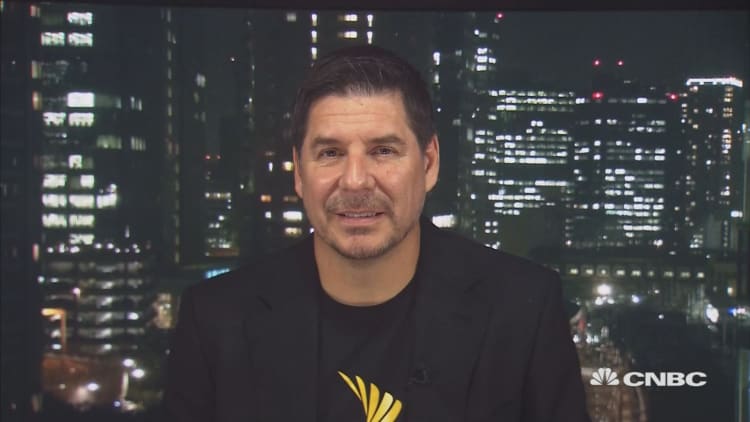
The Department of Justice announced Friday that it has reached an agreement on the more than $26 billion merger between T-Mobile and Sprint.
Following the announcement, shares of T-Mobile and Sprint hit new all-time highs of $85.22 and $8.06, respectively. Shares of Dish Network climbed as much as 3.5%.
As part of the agreement, Dish will pay $5 billion for a combination of divested assets including Sprint's Boost Mobile, Virgin Mobile and other prepaid phone businesses, as well as some of Sprint's wireless spectrum. T-Mobile will make at least 20,000 cell sites and hundreds of retail stores available to the company. Dish will also be able to access T-Mobile's network for seven years.
Makan Delrahim, head of the DOJ's antitrust division, said without these remedies, the merger would "substantially harm competition."
"Americans' access to fast, reliable and affordable wireless connectivity is critically important to our economy and to every American consumer and to their way of life," he said at a news conference announcing the agreement.
Delrahim added that the agreement establishes Dish as a "disruptive force in wireless."
T-Mobile and Sprint said they expect regulators will approve the merger in the third quarter and the deal to close in the second half of this year.
Separately, Dish announced it struck an agreement with the Federal Communications Commission to establish a 5G broadband network covering 70% of the U.S. population by June 2023. If it doesn't meet that deadline, it will pay the U.S. Treasury as much as $2.2 billion.
State attorneys general from Nebraska, Kansas, Ohio, Oklahoma and South Dakota have signed onto the agreement. However, T-Mobile and Sprint still face an ongoing lawsuit from 13 state attorneys general and the District of Columbia.
Led by New York and California, the case seeks to block the deal on anti-competitive grounds.
The merger cannot be finalized until after that case is resolved. The trial is set to begin on Oct. 7, but that date could be pushed back until Dec. 9, given the structural changes to the merger announced Friday.
On a call with reporters, New York Attorney General Letitia James declined to comment on whether the trial will be postponed as a result of Friday's announcement.
James added that she's concerned Dish doesn't have the experience to serve as a "viable competitor" in the prepaid wireless industry or to build out a wireless network on its own.
"We have serious concerns that cobbling together this new fourth mobile player, with the government picking winners and losers, will not address the merger's harm to consumers, workers and innovation," James said in a statement.
A spokesperson for California's attorney general, Xavier Becerra, said, "We're reviewing the announced settlement, but our bottom line remains the same: protect consumers and competition."

On T-Mobile's second-quarter earnings call Friday, CEO John Legere said the company is "willing to engage with state AGs" concerned about the merger, including those who filed the lawsuit.
"We've had conversations with many of the states involved," Legere said. "We'll continue those conversations and I'm very confident we will find what it necessary for them to join in."
In an interview with CNBC's David Faber, Sprint Chairman Marcelo Claure maintained that Dish will be a viable competitor once the deal is approved.
"You can see by the level of concessions that we have made in terms of giving Dish access to the new network ... disposing our 800 MHz spectrum, giving them access to some of our stores, some of our towers, buying our incredible brands, Boost and Virgin," Claure said. "I think Dish will be set to be a viable competitor."
The blockbuster tie-up, which was announced more than a year ago, consolidates the nation's third- and fourth-largest wireless providers and creates a combined company with an enterprise value of roughly $160 billion.
It brings an end to years of negotiations between the companies. Sprint parent SoftBank tried and failed to float a merger with T-Mobile in 2014 due to regulatory concerns, then deal talks fell through again in 2017 after SoftBank expressed doubts about giving up control of Sprint.
The DOJ decision was expected to come out Thursday, but was delayed as the department spoke with states and encouraged them to support the deal, according to The Wall Street Journal.
Claure said he hopes the state attorneys who brought the lawsuit will understand the potential value that could come from the deal.
"If I'm a state attorney, I'm going to look at how is this good for my state," Claure said. "I'm really hoping this doesn't turn into [a] political fight ... I have a lot of faith in the state attorneys general that once they understand the consent decree, and the level of competition that's going to exist in the market, that hopefully they will sit down and be able to reach an agreement with us."
The deal received comparatively swift approval from the FCC in May after T-Mobile and Sprint agreed to invest in rural broadband development and build new 5G infrastructure.


